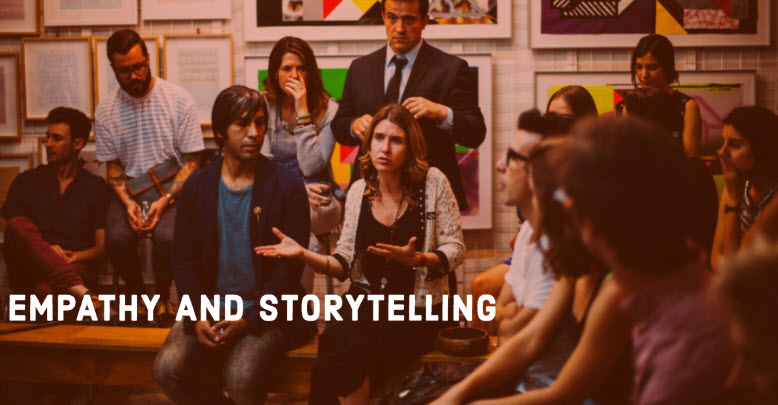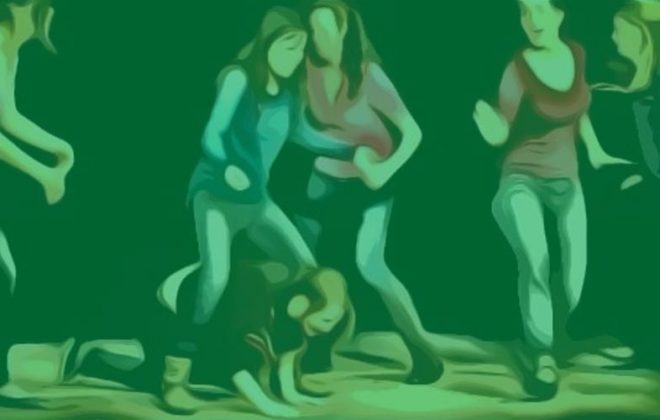
Empathy and Storytelling
Improv is often explained as theater that you “make up on the fly.” Indeed, improvisational theater in a performance setting features entire stories and characters invented on the spot entirely from imagination. But improv in a therapeutic setting is deeply rooted in exploring personal stories through drama, and thus requires us to be able to share such stories. Telling personal stories in a group setting fosters empathy between the group members and establishes a sense of community.
When we share stories we experience a chemical reaction within our brains that prepares us to empathize with another person. The act of sharing our story or hearing another person’s triggers our bodies to release Cortisol and Oxytocin, hormones associated with feelings of importance and caring. The result is a mixture of chemicals that put us in a position to feel the emotional weight of the story as well as increased feelings of compassion. Empathic Workplace founder Angelo Nino refers to these hormones as an “Empathy Cocktail,” preparing us to make a meaningful connection with another human being.
In the group lesson last week, we played a storytelling game in which improvisers worked together to tell a story by adding one sentence at a time. These stories were entirely made up, but the goal was to provide an introduction to storytelling exercises so that we could begin to explore true personal stories through improvisation. Many of the invented stories had strong messages of hope and happy endings. (Including a memorable tale about Goldilocks falling in love with a garbage man).
While the improvised stories were received positively by the group, we knew transitioning from tales of princesses and wizards into true life stories was a major leap. To facilitate this gap, Lisa broke the participants into smaller groups and asked each group member to spend one minute telling a story from their life. She recommended a story about a silly or embarrassing moment, or perhaps a happy memory. The small groups and time restraints limited the level of exposure in the activity and reduced potential anxiety about sharing. The recommendation of a silly story was designed to do the same.
Even with the specifications to make the environment more comfortable, in my group there was immediate hesitation. Two members of my small group immediately said they would not participate. A third said he would only share if we all picked a theme to tell our stories around so that they might all be similar. As a group we decided to all share stories about times we owed someone money.
I asked the woman to my left, who had been one of the members to initially refuse participation, if she would be willing to share a story on the shared topic. She agreed, and began her story before suddenly stopping. She said she would instead share a different story. This new story centered around a deeply painful personal memory, and her bravery and willingness to be open in the group had an immediate effect. The next sharer, the man who had initially requested the shared topic of money, also opted to tell a story with powerful emotional resonance. One by one each group member shared a moment of their lives that required great strength to speak about openly.
As we discussed reflections on the lesson with the group, one individual said they appreciated being able to get to know their peers better by discussing their lives in smaller, more intimate groups. In treatment settings, most of one’s time is spent in large groups discussing subjects that are often connecting to upsetting memories or trauma. The goal of the storytelling lesson was to allow the participants to bond with each other by forging an empathic connection through storytelling. In this way the trauma and painful memories shared in later treatment groups might be easier to process as the participants have the shared experience of telling their stories through improv.
A few example modules include:
- Magic Words: Communication and “Yes, And”
- On the Spot: Public Speaking and Performance Anxiety/Stage Fright
- Heal Thyself: Humor and Self Care
- Let Go: Stress Reduction Through Improv
- Us is More: Group Mind and Team-Building
- Feelin’ It: Emotional Intelligence and Empathy
- and many more . . .
Tags In
Related Posts
Categories
- Advocacy (1)
- Articulate (2)
- From the Advisory Board (1)
- Improv (13)
- Improv and Children (6)
- Improv Exercises (28)
- Improv Life Lessons (23)
- Interviews (2)
- ITG Blog (29)
- ITG Games and Exercises (26)
- ITG Podcasts (3)
- Look Who Gets It (10)
- Meditation (1)
- Neuroplasticity (5)
- Self-Care (9)
- Storytelling (3)
- Teamwork (6)
- Therapy (5)
- Yes, and (13)





